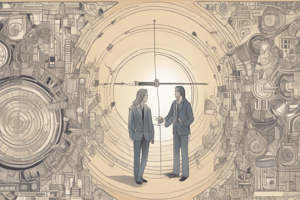Podcast
Questions and Answers
What does the need for power, as stated by McClelland, refer to?
What does the need for power, as stated by McClelland, refer to?
- The need for job security
- The need for self-actualization
- The desire for friendly and close interpersonal relationships
- The need to make others behave in a way in which they would not have behaved otherwise (correct)
According to self-determination theory, what happens when extrinsic rewards are introduced for a previously enjoyed task?
According to self-determination theory, what happens when extrinsic rewards are introduced for a previously enjoyed task?
- Intrinsic interest in the task is undermined (correct)
- Intrinsic interest in the task increases
- The task becomes more challenging
- Intrinsic interest in the task remains the same
What is the main idea behind self-concordance theory?
What is the main idea behind self-concordance theory?
- People's reasons for pursuing goals are consistent with their interests and core values (correct)
- People are motivated by extrinsic rewards
- People are motivated by intrinsic interest
- People are motivated by power and achievement
What is job engagement, according to contemporary motivation theories?
What is job engagement, according to contemporary motivation theories?
What are the three key elements of goal-setting theory?
What are the three key elements of goal-setting theory?
What is a criticism of goal-setting theory?
What is a criticism of goal-setting theory?
What is the relationship between an employee's sense of control and motivation, according to self-determination theory?
What is the relationship between an employee's sense of control and motivation, according to self-determination theory?
What is a potential consequence of high job engagement, according to critics?
What is a potential consequence of high job engagement, according to critics?
According to the Hierarchy of Needs theory, which of the following needs are satisfied internally?
According to the Hierarchy of Needs theory, which of the following needs are satisfied internally?
Theory X assumes that employees:
Theory X assumes that employees:
Which theory states that job satisfaction and dissatisfaction are not determined by the same factors?
Which theory states that job satisfaction and dissatisfaction are not determined by the same factors?
Which of the following is NOT one of the three needs in McClelland's Theory of Needs?
Which of the following is NOT one of the three needs in McClelland's Theory of Needs?
What is a criticism of the Hierarchy of Needs theory?
What is a criticism of the Hierarchy of Needs theory?
What is the main difference between Theory X and Theory Y?
What is the main difference between Theory X and Theory Y?
Which theory differentiates between intrinsic and extrinsic factors?
Which theory differentiates between intrinsic and extrinsic factors?
What is the focus of researchers and McClelland in McClelland's Theory of Needs?
What is the focus of researchers and McClelland in McClelland's Theory of Needs?
What does interpersonal justice refer to?
What does interpersonal justice refer to?
What is the main idea behind expectancy theory?
What is the main idea behind expectancy theory?
What can influence employee motivation according to the text?
What can influence employee motivation according to the text?
What type of justice refers to the fairness of outcome distribution?
What type of justice refers to the fairness of outcome distribution?
What is the main limitation of expectancy theory?
What is the main limitation of expectancy theory?
What is the main idea behind the concept of organizational justice?
What is the main idea behind the concept of organizational justice?
Flashcards are hidden until you start studying
Study Notes
Contemporary Theories of Motivation
- Self-determination theory: people prefer to have control over their actions, and extrinsic rewards can undermine intrinsic motivation
- Cognitive evaluation theory: extrinsic rewards can reduce intrinsic interest in a task
- Self-concordance theory: people's reasons for pursuing goals should align with their interests and core values
- Job engagement: the investment of physical, cognitive, and emotional energies into job performance
- Goal-setting theory: specific and difficult goals with feedback lead to higher performance
- Criticism of goal-setting theory: people might focus too much on specific outcomes and ignore changing conditions
Early Theories of Motivation
Hierarchy of Needs Theory
- Physiological needs: bodily needs (hunger, thirst, sex, shelter)
- Safety needs: security and protection from physical and emotional harm
- Social needs: affection, belongingness, acceptance
- Esteem needs: autonomy, achievement, self-respect
- Self-actualization needs: drive to become what one is capable of becoming (growth, self-fulfilment)
Theory X and Y
- Theory X: managers assume employees dislike work and must be coerced to perform
- Theory Y: managers assume employees are motivated and eager to perform
Two-Factor Theory
- Intrinsic factors (achievement, recognition) related to job satisfaction
- Extrinsic factors (company policies, payment) associated with dissatisfaction
- Hygiene factors (company policy, salary, supervision, etc.): basic conditions that prevent dissatisfaction
McClelland's Theory of Needs
- Need for Achievement: drive to excel and succeed
- Need for Power: need to make others behave in a way they would not have otherwise
- Need for Affiliation: desire for friendly and close interpersonal relationships
Expectancy Theory
- The strength of a tendency to act in a certain way depends on the expectation of a given outcome and the attractiveness of that outcome
- Critics argue it has limited use and is more valid where individuals clearly perceive effort-performance and performance-reward linkages
Studying That Suits You
Use AI to generate personalized quizzes and flashcards to suit your learning preferences.




